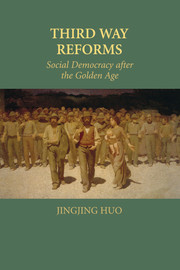Book contents
- Frontmatter
- Contents
- Tables and Figures
- Acknowledgments
- 1 Introduction
- 2 Theorizing the Third Way
- 3 Constraints on Action: Institutions and Ideas
- 4 Prelude to the Third Way: The Unemployment Problem and Earlier Responses
- 5 Expansion in Active Protection
- 6 Restructuring Passive Protection
- 7 Economic and Corporatist Contexts for the Third Way
- 8 Conclusion: Theories of Possibilities
- References
- Index
8 - Conclusion: Theories of Possibilities
Published online by Cambridge University Press: 20 February 2010
- Frontmatter
- Contents
- Tables and Figures
- Acknowledgments
- 1 Introduction
- 2 Theorizing the Third Way
- 3 Constraints on Action: Institutions and Ideas
- 4 Prelude to the Third Way: The Unemployment Problem and Earlier Responses
- 5 Expansion in Active Protection
- 6 Restructuring Passive Protection
- 7 Economic and Corporatist Contexts for the Third Way
- 8 Conclusion: Theories of Possibilities
- References
- Index
Summary
Based on the experience of nine countries, this book has proposed several theories about various aspects of the third way. Among these theoretical propositions, the most important for the book's purpose is the possibility for conflicting ideologies to create incentives for making costly changes to institutions. This is the main focus of the book. As a general thesis potentially speaking to all patterns of institutional evolution, I used it to evaluate two well-known competing theories of welfare state changes: power resources and path dependency. The book's main task has been to demonstrate the possible circumstances under which ideological beliefs can create sufficient incentives for absorbing the cost of unmaking old rules and making new ones. On this basis, the book contributes to the welfare state literature, in outlining the possibilities for power resources to create path-breaking, rather than path-dependent, welfare reforms after the Golden Age.
In the process of establishing this argument, I have also proposed several other related theories. These include a thesis on contemporary social democratic ideological transformation, a thesis on the way in which positive externalities that result from being organized can spill benefits over to unorganized outsiders, and a thesis about the components and structure of the third way as a policy paradigm. None of these theories is deterministic about the outcomes. They merely identify the often (though not always) necessary, rather than sufficient, conditions for these outcomes to eventuate. The book, for example, does not lend strong support to those who believe that ideology is more powerful than institutional legacy, or that social democracy will reduce the insider–outsider divide. But the book does make clear that, given the right conditions, it can happen.
Information
- Type
- Chapter
- Information
- Third Way ReformsSocial Democracy After the Golden Age, pp. 314 - 323Publisher: Cambridge University PressPrint publication year: 2009
